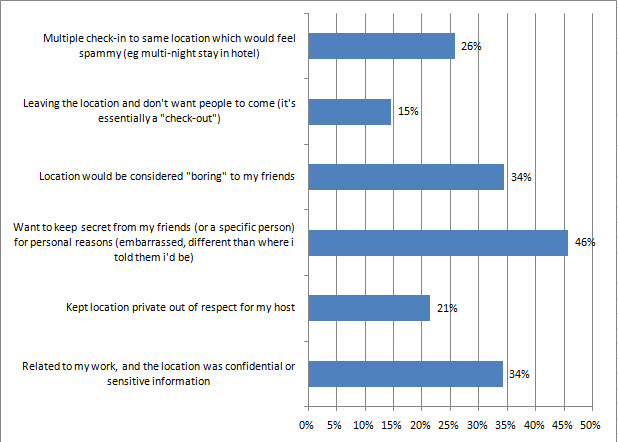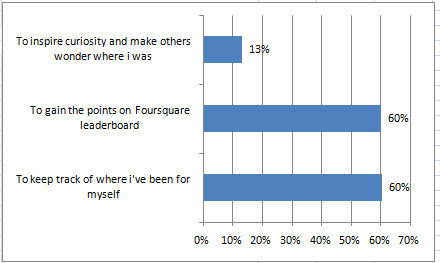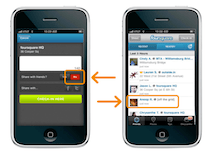
This is a guest post by Hunter Walk (@hunterwalk) who conducted a survey of 500 Foursquare users to better understand their check in behaviors and motivations. His obsession with Foursquare is unrelated to his day job leading the consumer product team at YouTube, although he did at one point hold the Mayorship of their San Bruno headquarters.
Have you noticed “Off the Grid” [OTG] appearing in your Foursquare feed recently? No, it’s not the latest trendy West Hollywood club or SF food cart. OTG is Foursquare’s “privacy” feature where you check in to a location but don’t disclose it to your friends (while gaining any applicable points, badges, etc). What purpose does it serve to notify your friends that you’re out on the town but to hide the location? And what does it tell us about the future of location-based services & privacy? This was the question I set out to answer by surveying nearly 500 Foursquare users.
The answers point to some ways that Foursquare can fend off Facebook Places by being an experience, not just a utility. It’s clear that the check in will be a commodity — there will be any number of services which allow you to push a geotag and location to your social stream of choice. That’s a utility. However, as I wrote earlier this year, Foursquare’s future is tied to its ability to be an experience, providing value on top of the check in. Here’s the data and four things learned:
1) Even Very Public People Have Private Moments [“Did I need to tell everyone I was getting a Brazilian wax job? but I wanted the points!!!”]
The single largest reason for OTG was hiding from friends [46%]. People gave a variety of motivations [examples: buying a gift for girlfriend, on a date, avoiding someone in particular, hiding one’s poor eating habits from friends, and seeing a doctor.]
Whether protecting their own location, or doing it out of respect for their host [21%], it’s clear that public people have private moments that fully public check in systems can’t fully respect. But why check in if you don’t want people to know where you are? That’s learning #2…
2) Foursquare as “My Local History” Is High Potential (And Underdeveloped)
Why check in off the grid? 60% of respondents cited the desire to keep track of where they’ve been for their own future reference. Currently, your Foursquare History is a flat set of your check ins but the user interest here points to the opportunity for a much more robust feature. One just needs to look at visualization tools such as WeePlaces to imagine how much more dynamic your Foursquare history could be presented. Let alone the possibilities of letting users annotate, organize and communicate with previous check in locations. Shouldn’t Foursquare be giving me the ability to create ongoing relationships with the venues I visit? I’ve been acquired as a customer so the ongoing remarketing costs are minimal. This is where I’m most bullish about Foursquare as a business — loyalty programs and offers; customer acquisition and retention instruments.
3) A Leaderboard Could Cost You Your Job [“Interviewing in another city, didn’t want current employer to know”]
Would you put your job at risk just to earn virtual points? 34% of respondents used OTG to check into a location that could have been considered confidential or sensitive to their job. And people wonder why social engineering works so well as a hacking tactic? A third of OTG check ins are some big honeypot of information about potential partnerships, acquisitions, job interviews and so on. Now THAT could be Foursquare’s killer business model – paid access to view private check ins ;-)
4) Don’t Hate the Playa, Hate the Game [“I want to be mayor of my office so I check in off the grid so my rival (competing with me for mayor) won’t realize! :)”]
Mayor stalking was the surprise motivation for many OTG check ins since they count towards mayorships but don’t display your name associated with the venue. This didn’t come up at all in my pre-survey discussions (I guess my Silicon Valley friends aren’t into mayorships — or were hiding their secrets!) but several respondents gave this as their reason. In fact, 60% of respondents overall noted that the points/mayorships are what motivate them to register OTG as opposed to skipping the check in altogether.
Other miscellaneous product thoughts:
- Events: As part of personal history, I would expect Foursquare to support “events” — limited time named instances at a particular venue — so that people can create temporal locations to check into without creating duplicate location entries.
- Check-out: Only 15% of users report using OTG to signal a “check out” — leaving a venue and not wanting to publish location out of concern friends will arrive to find you departed. There had been some speculation that Foursquare would build a check out feature. I think it’s more likely that Foursquare will auto check you out based on pinging your location in the background, and that this will be an opt-out feature.
- Suppress Notifications on Duplicate Check Ins: 26% of people utilize OTG for repeat check ins at a location over the course of a few days (such as a hotel). These could easily be public but collapsed into a single line. Or subsequent check ins might be public, but not published as alerts.
What does this mean for Foursquare vs Facebook Places?
Foursquare has a window of opportunity to build an experience on top of geolocation. The game mechanics are unlikely to be pursued by Facebook who have already allowed social gaming to be a third party business on their platform. The ability to have a personal location diary combining public and private check ins is also unlikely to be duplicated by Facebook given Mark Zuckerberg’s declarations about the importance of public sharing. They likely both have designs on loyalty programs and offers but Foursquare has the pure play focus.
It’s definitely going to be a feature dogfight in the nearterm as Foursquare makes their bets and decides what, if any, relationship they should have with Places. I expect many geo services to leverage the Places API for pushing check ins to Facebook (as SCVNGR just announced). One could certainly imagine a future where Foursquare places value on building an experience on top of the check in but cares less about owning the social graph (or even places directory) outright, deciding instead to focus on game mechanics, reviews/recommended places, and merchant offers/loyalty programs. I bet this is a hotly debated topic amongst CEO Dennis Crowley & team who last said they were still deciding how to work with Places.
Below, find the survey results.
Survey: Why did you decide to hide your location from your friends? [respondents could select more than one answer]

Survey: Given that the location was kept secret, why did you check-in at all? [respondents could select more than one answer]

